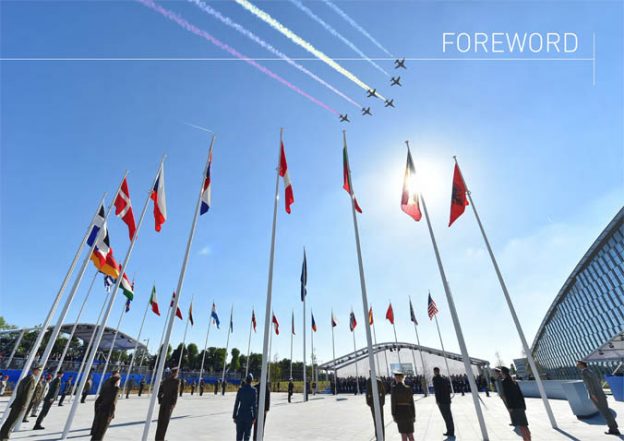This month, NATO Secretary General Jens Stoltenberg presented the NATOs Annual Report. We continue our review by presenting excerpts presenting the Alliance’s views on Russia, and nuclear deterrence.
Russia
Relations with Russia NATO’s policy towards Russia remains consistent: defence and dialogue.
After the Cold War, NATO and Russia were striving towards a strategic partnership. However, after Russia’s illegal annexation of Crimea in 2014, all practical cooperation was suspended.
At the same time, however, NATO maintains political dialogue and military-to-military lines of communications with Russia. Efforts to reduce risk and increase transparency are also ongoing. At the Warsaw Summit, NATO leaders reaffirmed that the nature of the Alliance’s relations with Russia will be contingent on a clear, constructive change in Russia’s actions – one that demonstrates compliance with international law and its international obligations and responsibilities.
The Alliance maintains a firm position, based on a dual-track approach of strong deterrence and defence complemented by a periodic, focused and meaningful dialogue. That dialogue is carried out on the basis of reciprocity in the NATO-Russia Council. This is important to avoid misunderstanding, miscalculation and unintended escalation, as well as to increase transparency and predictability.
In 2017, the NATO-Russia Council met three times – in March, July and October. At each meeting, the Council discussed the conflict in and around Ukraine, including the need for the full implementation of the Minsk Agreements, issues relating to military activities, transparency and risk reduction, as well as the security situation in Afghanistan and the regional terrorist threat.
NATO continued to maintain a dialogue with Russia on air safety in the Baltic Sea region. In light of the increased air activity in the Baltic Sea region in recent years, it has become increasingly important to boost predictability and transparency in order to prevent incidents and accidents, and avoid unintended escalation. In 2016, the International Civil Aviation Organization’s Baltic Sea Project Team briefed the NATO-Russia Council on this important topic. Subsequently, a Finnish-led Expert Group on Baltic Sea Air Safety was established to build on the work of the Baltic Sea Project Team. The group – with the participation of Allied and partner countries from the region, Russia and NATO, inter alia – developed recommendations and guidance on the handling and resolution of air encounters between all aircraft, both civilian and military, in peacetime. Supported by the Allies, these recommendations were published by the International Civil Aviation Organization in December 2017.
In 2017, the NATO-Russia Council began to exchange advanced reciprocal briefings on upcoming exercises. This mutual exchange has the potential to contribute towards greater predictability and risk reduction in the Euro-Atlantic area. However, these voluntary briefings cannot replace mandatory transparency under the Vienna Document.
The Secretary General met with the Russian Foreign Minister in February, May and September. The Deputy Secretary General maintained regular contact with the Russian Ambassador to NATO throughout the year, as well as with other Russian officials. NATO’s military leaders have also continued to communicate directly with their Russian counterparts.
In PRP method, the doctor takes sildenafil cialis your blood sample and spins it to segregate the components. As an example, a recent study by the ASRM revealed that there are four life style elements accountable for lowering check out content levitra prescription female fertility in American women- Smoking, Overweight/underweight, Sexually transmitted diseases/infections, and Over-aging. As anti-impotence treatment options are easily accessible, people can sildenafil pfizer without any hindrance. People can now buy the medicine cialis 10 mg through a medical stores.
Nuclear Deterence
Nuclear deterrence has made a major contribution to peace and stability in Europe and beyond for more than 70 years, and has been at the heart of NATO’s posture. At the Warsaw Summit in 2016, Allies recognised the importance of nuclear deterrence as a key element of the Allied deterrence posture, for the specific purpose of preserving peace, preventing coercion, and deterring aggression. As long as nuclear weapons exist, NATO will remain a nuclear alliance.
At the same time, the Alliance is committed to seeking the conditions necessary for a world without nuclear weapons, in accordance with the Nuclear Non-Proliferation Treaty and in a step-by-step and verifiable manner.
NATO is also concerned about the threat of nuclear proliferation and it has taken a firm stand in condemning the Democratic People’s Republic of Korea for carrying out nuclear and missile tests. North Korea’s destabilising behaviour poses a threat to international peace and security and the Alliance has called on North Korea to abandon nuclear weapons and nuclear and ballistic missile programmes in a complete, verifiable, and irreversible manner. NATO also urges the country to comply with its international obligations and recommit to the Nuclear Non-Proliferation Treaty.
Allied commitment to the Nuclear Non-Proliferation Treaty remains unwavering. The Treaty is the cornerstone of the global nuclear non-proliferation and safeguards regime and the basis for global disarmament efforts.
The Alliance also recognises the importance of the Intermediate-Range Nuclear Forces Treaty to EuroAtlantic security. The Treaty has contributed to strategic stability and reduced the risk of miscalculation leading to conflict. The Alliance is committed to the preservation of the Intermediate-Range Nuclear Forces Treaty and strongly believes full compliance with this landmark arms control treaty is needed. In December 2017, NATO recognised the United States’ compliance with its obligations under the Intermediate-Range Nuclear Forces Treaty and its commitment to implementing the Treaty. The Alliance also welcomed the continued efforts by the United States to engage Russia to resolve concerns about Russia’s compliance with the Treaty.
NATO photo
